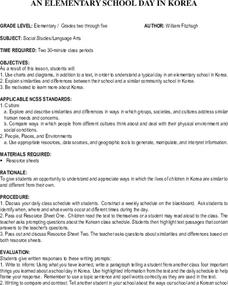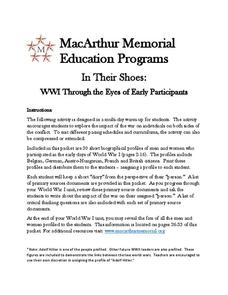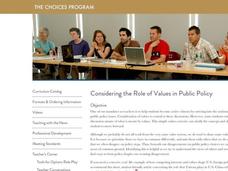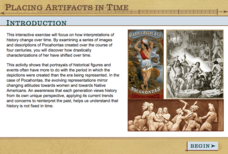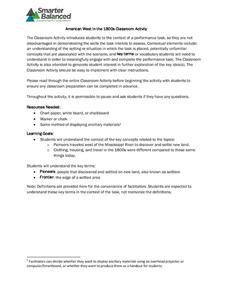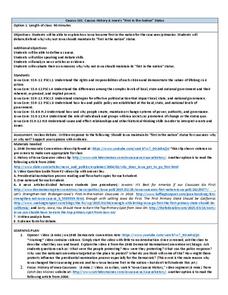Curated OER
How Cultures Differ - Two Different Perspectives on the Same Even
Learners explore the effects of culture through the story Running by Peter Hessler. In this geography and cultural lesson, students act as newspaper reporters covering the story of the race. Learners write newspaper articles as reporters...
Curated OER
The Flow of Women's Work: How Cultures are Alike and Different?
Learners examine gender roles in various cultures. In this flow of women's work instructional activity, students compare water related work in rural Africa to that in their own households.
Curated OER
Compare And Contrast-- People of Eminence
In this social studies worksheet, students are directed to a Web site to read about famous people. Students choose 2 people and use a Venn diagram to compare and contrast. Students then investigate the difference between being "famous"...
Jamestown-Yorktown Foundation
What Was Everyday Life like in Colonial Virginia?
After reflecting on jobs people perform in the present day, scholars discuss what they believe jobs would have been like in Colonial Virginia during the American Revolution. Small groups then perform a jigsaw using informational packets....
Curated OER
Then and Now: Life in Early America, 1740 - 1840
Students complete a unit of lessons that examine life in early America from 1740-1840. They compare items with similar objects we use today, explore various websites, create a paper doll, try and guess the function of various objects,...
Curated OER
Barrels and Buckets: Access to Water - What Would It Be Like to Live in Africa?
Learners compare water access in the United States with that of Africa. In this water access lesson, students located Ghana and Kenya on a globe before reading Peace Corps Volunteer accounts of the difficulty of accessing clean water....
Facing History and Ourselves
When Differences Matter
Jane Elliott's controversial blue eyes/brown eyes experiment detailed in the film A Class Divided leads to a discussion of privilege, social power, and opportunity. Viewers note how the children react to the experiment, share their...
Curated OER
Stories in Quilts
Have your class analyze the narrative art in quilts. They identify elements in this domestic art and the stories they tell. They define a story quilt, view an example, and analyze the work of Harriet Power. This is a great instructional...
Curated OER
Lincoln is in the House! ("Name-Dropping" Poems and the Power of Connotation)
“What’s in a name?” Just about everything. Barack Obama, Vincent van Gogh, Justin Bieber. Famous names evoke a multitude of reactions and poets often use the names of famous people in their works precisely because names carry...
Curated OER
British Imperialism in India
Tenth graders learn how the differences between Indian and British cultural perspectives, as seen in works of art. Students participate in discussion of the differences in how individuals are viewes by others.
Curated OER
An Elementary School Day in Korea
Students study the similarities and differences between their school and a school in Korea. In this culture study lesson, students discuss and list their classroom's weekly schedule. Students then read about a Korean class schedule and...
Council for Economic Education
What Do People Want to Wear?
Who doesn't love fashion, especially when it can be applied to economics, supply, demand, market trends, and price equilibrium. Curious young consumers examine market scenarios to determine their effect on the demand and price for...
MacArthur Memorial
In Their Shoes: WWI Through the Eyes of Early Participants
Several social activities provide showcase the perspective of many prominent figures in World War I history. Students read an assigned case study about a memorable person and complete several activities to further understand this...
Curated OER
People are People
Explore human diversity in this human rights lesson. Middle schoolers compare novels, speeches, videos, and short stories that promote diversity and basic human rights. They complete daily coursework as they read the selected literature...
Curated OER
We are all alike, We are all different
Students investigate similarites and differences. In this multi-cultural lesson, students discuss how people are alike and how they are different by comparing apples to people.
Brown University
Considering the Role of Values in Public Policy
Strong opinions come from deeply held values. Young citizens explore the values that are most important to them in a class discussion and activity. As they prioritize a list of values cards that include freedom, justice, and democracy,...
EduGAINs
Coureurs de Bois, First Nation Peoples, and the Fur Trade
The interactions between the Coureurs de bois (runners of the woods) and the First Nation Peoples as they engaged in the fur trade are the focus on this Canadian history exercise. Kids select learning centers based on their learning...
Museum of Tolerance
Disenfranchised People of the New Nation
Why are some immigrant groups in the United States embraced while others become disenfranchised? To answer this question, teams investigate why groups emigrated to the US, why some of these these peoples were disenfranchised, and their...
Jamestown-Yorktown Foundation
What Was Everyday Life like in Colonial Virginia?
What was everyday life like in Colonial Virginia? To find the answer cooperative groups work collaboratively to read an informational handout and complete a graphic organizer. The speaker of the group then shares their new-found...
Annenberg Foundation
Placing Artifacts in Time
Can history distort the true story behind famous people? Scholars analyze the many faces of the Native American Pocahontas. Incorporating technology and historical thinking skills, they uncover the many different sides to the Pocahontas...
BW Walch
Vending Machine Bans Increase in Schools Nationwide
Does a ban on vending machines infringe on student rights, or do school officials have an obligation to monitor foods sold on school grounds? Your class members will explore the educational, health, and financial issues related to...
Smarter Balanced
American West in the 1800s
To establish a context for an assessment or a study of pioneers and the American frontier in the 1800s, groups examine photos and record observations about clothing, housing, and travel.
Caucus 101
Caucus History and Iowa’s “First in the Nation” Status
What is a caucus? Why is Iowa's first? Why did Iowa shift to the caucus format? After researching these basic questions, class members debate the question of whether or not Iowa should maintain its "first in the nation" status for caucuses.
Overcoming Obstacles
Blowin' in the Wind
Working together isn't as easy as it looks! Small groups of classmates try to keep a balloon in the air using only a straw, their breath, and team communication.












